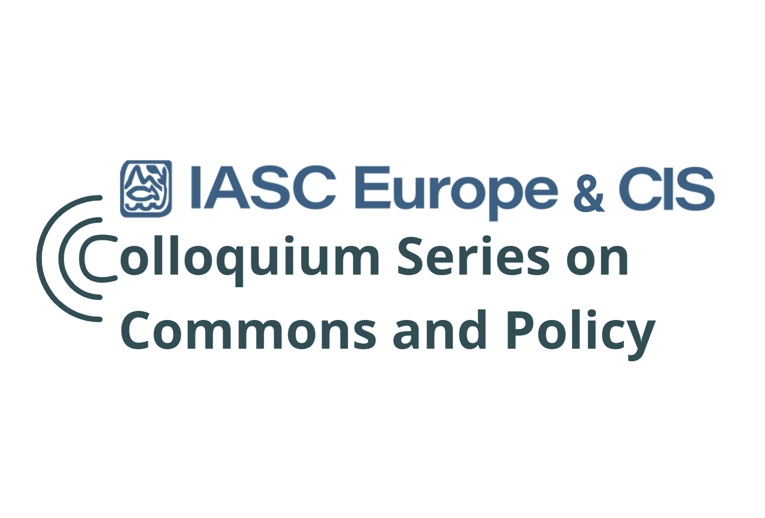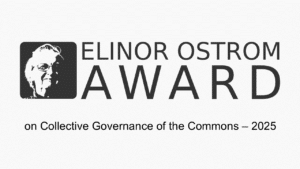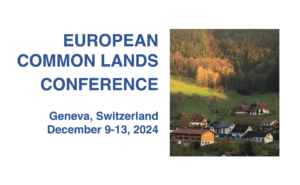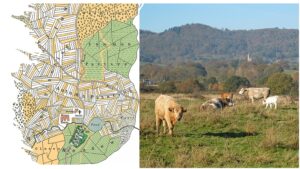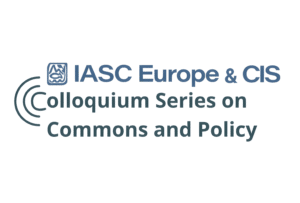Based on the experience of the first IASC Europe & CIS Colloquium Series on Commons and Policy, in 2023, the Regional Chapter of IASC Europe & CIS hosts the next colloquium series featuring selected presentations and plenary sessions.
Thematically, the presentations within the series will be dedicated to policy issues related to the commons and bringing the commons knowledge, policy, and practice closer in Europe & CIS and beyond.
IASC Europe & CIS is dedicated to supporting the communication among IASC members to facilitate content-based exchange and cross-disciplinary networking.
The table below will be gradually updated to provide more detailed information on speakers and topics for each date. The meetings will take place online on Fridays from 13:30 to 15:00 CET.
For joining the meetings, contact Tobias Haller at tobias.haller@unibe.ch. Information with the meeting link will also follow via direct communication to members. If you are not a member, see the information on how to become one and benefits here.
Date
Speaker(s)
Presentation
April 14, 2023
Alex Pazaitis
Tallin University of Technology and P2P Lab
Maro Pantazidou
University of York
Transforming time(s): The politics of valuing times as commons
Abstract
How does the system of production influence the way we perceive and value time? In our everyday lives we think and act upon value and time in ways that we measure, divide, exchange, debit and credit them. We lose them or gain them; we buy or sell it in the market; ultimately, we protest and struggle for equal remuneration of them, and the right to invest them to our loved ones, our leisure, and rest. While our struggles focus on valuing time as an individual asset, not much different from financial or real estate assets, we remain blind to how much of its “value” we owe to the struggles of others. Time is infinite, affective, and collectively valued, though structurally adjusted to get managed in capitalism. Can the commons provide a transcending perception of time that emancipates us from the treadmill of our times?
April 21, 2023
Massimo de Angelis
University of East London
The capitalist pyramid and the commons
Abstract
In this paper I develop an interpretative model to frame the hierarchical layers of systemic entanglements that operate to build constraints and shape social cooperation (or the common as condition) to keep it under the hegemony of what I call “capital’s measure of things”. By building on the work of autonomist Marxist Romano Alquati, ecological and feminist perspectives, as well as elements of system and complexity theory, I develop the capitalist pyramid, a model of the systemic mechanisms that — considered as a totality — seek to order the meta-finalities of social cooperation in such a way that social reproduction broadly understood (including ecological reproduction) is subordinated to the reproduction of capital and the maintenance of its domination over social cooperation, thus perpetrating social and ecological crises. Ultimately, the possibilities of radical social change rest on the possibility to turn upside down the hierarchy of meta-finalities and construct forms of social cooperation that rank social reproduction above the reproduction of capital thus allowing us to move from the common as condition of social cooperation hegemonised by capital to the common as a transformative project of social cooperation. I argue that the model allows us to come to term with the broad problematic of social change, appreciate some key challenges that local commons and more broadly social movements face in engendering radical social change, and allow us to appreciate commoning as the key transformational praxis that produces alternative “measures of things”.
April 28, 2023
Alex Pazaitis and Massimo de Angelis
Plenary session: Theoretical reflections on commonalities and differences of the two approaches
May 5, 2023
David Zetland
Leiden University College
The high costs of cheap permit parking in Amsterdam
Abstract
In 1992, Amsterdam’s voters pushed for a more-aggressive autoluw (`nearly car free”) policy, but progress has been slow. Hourly parking tariffs are the highest in the country, but more cars than ever park in Amsterdam. We explore this promise-results gap in a spatial comparison of the price of parking (set by bureaucrats) and living (set by market forces). If prices balance supply and demand, then the ratios of parking prices to living prices should be relatively and absolutely balanced, but they are not. We find that the prices of parking permits (for residents) are much lower, throughout the city, than the prices of living space or hourly parking (for visitors). We also find excessively low parking prices in Amsterdam Noord, which encourages car dependency and takes public space from other uses. Finally, we explain how the city’s attempt to reconcile its policy of cheap parking permits with its goal of reducing street parking by subsidizing garages is extremely costly and contrary to the autoluw promise. We recommend increasing permit prices to reduce the number of cars parked in the city and directing increased revenues to realizing the many benefits of an autoluw city.
May 12, 2023
Benjamin Coriat
University Sorbonne Paris Nord
Health and access to care: why it is necessary and urgent to switch from a global public good approach to a commons-based approach
Abstract
During the Covid 19 Pandemics, there have been countless calls for the creation of “global public goods” or “global commons” issued by a variety of actors with sometimes diametrically opposed views, as if the two notions had the same meaning. And indeed, even today these notions are still often used as synonyms and interchangeable, leading to an amalgamation of concepts. The meaning and implications of using one notion or other notion (global public good, global commons) is never examined. We believe, that, contrary to the dominant view, it is urgent to put an end to this confusion which is not only of a semantic order, and has huge economic and social implications. In this talk, we shall start by recalling what constitutes the notion of “Global Public Good” and by extension the content of what can be called the GPG approach. Then, by difference we intend to present the notion of common good and the commons based approach. Finally, in a concluding section, we shall present some of the most significant initiatives taken during the covid-19 pandemic, designed and deployed to producing and distributing health products as common goods. Our overall ambition being to highlight that the deployment of the commons based approach that we are calling for, is not a utopia, as it is already moving on.
May 19, 2023
Dagmar Diesner
Coventry University
A timeline of political events leading to the privatisation of seeds since 1945
Abstract
Seed is the first link in the food chain. It is the primary means of production in agriculture. Over the centuries, seeds had been evolved by farmers. Farmers have been breeding diverse varieties to adapt to diverse eco-systems, diverse economic and cultural needs. Farmers have freely saved and exchanged seed, they freely planted diversity of crops to maintain ecosystems, to meet their diverse needs and earn incomes. The freedom of exchange and growth of food biodiversity had been increasingly curtailed by the process for commodifying and privatising seeds, a process that at least had begun in the mid 18th century. My paper will trace the growing interest of patenting seeds in conjunction with the end of colonialism, and discuss the impact of restructuring European agriculture with the Treaty of Rome in 1948 and thereafter with foreign aid policies. These political events led to the beginning of the commodification of seeds on a large-scale. With the neo-liberalisation of agriculture in 1994 under the World Trade Organisation, new laws on seeds-saving by farmers had been under attack globally. The conversion from commodification to the privatisation of seeds put farmers’ livelihoods in peril, continued the diminishment of food biodiversity by over 93% in the past century, and has contributed to the collapse of the eco-system. The paper ends with the call for seed sovereignty by the global farmer’s movement la Via Campesina. It demands to view the seed as a commons, to grant farmers the right to save and exchange seeds. This tension between seeds as a commons or seeds as capital defines the struggle of who is controlling food production and the right to life – farmers or capital?
May 26, 2023
David Zetland
Benjamin Coriat
Dagmar Diesner
Plenary session: Reflections and theoretical implications of the empirical studies

